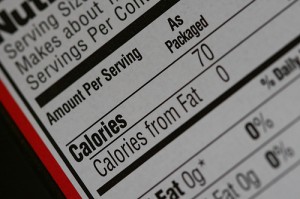It’s a simple enough question: why are all the nutrition labels in the U.S. standardized to 2,000 calories per day? Who chose that number? Is it an accurate representation of what we should follow?

I was having this exact conversation with my friend @Krazy_Kris on Twitter last week. She’s been living healthier, exercising, and blogging about her journey. She’d been following the USDA recommended 2,000 calories per day and hadn’t lost any weight. Huh, she thought, started researching, and discovered she needed to eat a few hundred calories less each day in order to lose about a pound a week. She was annoyed, feeling a bit misled by her government.
What your daily calorie count should be varies quite a bit; it depends on age, weight, gender, amount of exercise, lifestyle, medical issues, etc. There is no true cookie cutter number that applies for everyone. Kris asked me where the 2,ooo calorie amount came from and I honestly didn’t know, so I went to find out. I was furious when I uncovered the answer.
I found the Executive Summary for the USRDA guidelines at health.gov, the U.S. Department of Health & Human Services’ health promotion website. These documents can be hard to decipher. I think the phrase “politically correct” emanated from people trying to write government documents that reflect the views of a combination of experts, lobbyists, and elected official interests … Anyway, there were key sections that jumped out at me:
Throughout most of this publication, examples use a 2,000-calorie level as a reference for consistency with the Nutrition Facts Panel. Although this level is used as a reference, recommended calorie intake will differ for individuals based on age, gender, and activity level. At each calorie level, individuals who eat nutrient-dense foods may be able to meet their recommended nutrient intake without consuming their full calorie allotment. The remaining calories ~ the discretionary calorie allowance (my emphasis)~ allow individuals flexibility to consume some foods and beverages that may contain added fats, added sugars, and alcohol. ~ USDA Executive Summary
Lobbyist Fingerprints
Additionally, in a prior paragraph the Executive Summary said the 2,000 calorie per day recommendation was based on “population weighted food intakes.” That is, Americans are already eating 2,000 calories per day, so we’ll just overlay the proper nutrient balance on top of those calories. There is no daily calorie recommendation at all built into the side of our food packaging; it’s based on what Americans already take in. As in our population which is 66% either overweight or obese.
Meanwhile, the pull-out quote above recommends that Americans eat nutrient dense foods and then blow the extra calories on fat, sugar, and booze. Are you serious? Does anyone think a group of well-educated nutritionists inserted that line? No ladies and gentlemen we’re looking at the work of a very strong food lobby.
So How Many Calories Do You Need?
I went in search of a chart with the recommended daily calorie levels and couldn’t find one! I spent a good hour surfing through government sites. The only thing I found was the MyPyramid.gov page which does have a handy calculator, but it gives you the daily value for the “nutrients you should consume for your weight and gender and lifestyle.” This means it calculates the calories you need for weight maintenance, not weight loss. I plugged my own data in and got 2,200 calories per day with nearly 300 calories for “excess,” i.e., the sugar, fat, and booze mentioned above.
I can tell you right now if I eat 2,200 calories per day I’ll gain weight. The MyPyramid page helpfully suggests, “Your calorie needs may be more or less than average so check your weight regularly. If you see unwanted weight gain, adjust the amount you’re eating.” Um, yeah, thanks for that … sheesh.
So how do you find out what your daily calorie intake should be? Honestly, the best you’re going to get is a general guideline. There are lots of calculators available and Kris mentions a few in her blog post. This is the one I use which is based on research out of the University of Maryland.
Why We Need to Educate Ourselves
Most of the numbers these other calorie calculators recommend are lower than the U.S. guidelines. Again, the food and agricultural industries don’t make more money if you eat less. The food lobbyists are pushing as hard as they can to nudge those numbers upward. They want you to eat more.
We can get great information from registered dietitians. If you can get a referral from your doctor to see one I strongly urge you to do so.
What do you think? Are you as furious as I am? Do you feel saddened that the U.S. government is taking good information and twisting it just enough to confuse and lead us astray? How are we going to improve our health if the government is giving us questionable information to begin with? Where do you get your nutritional information?
Let me know your thoughts …
Thanks,
Lisa